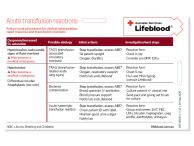Don’t have an account?
Select the donation type you’d like to make
When to suspect this adverse reaction
Normally seen between 24 hours and 28 days after a red cell transfusion.
Signs and symptoms are similar to an acute transfusion reaction but are less severe.
The patient may have fever, inadequate post-transfusion rise in Hb, jaundice, high LDH, reticulocytosis, spherocytosis, positive antibody screen and a positive direct antiglobulin test (DAT).
In DHTRs the haemolysis is mainly extravascular, so although haemoglobinuria may occur in rare cases, acute renal failure and DIC are not normally seen.
Occur in approximately 1:2,500 of transfusions, but found more frequently in patients who have received frequent blood transfusions.
Usual causes
After transfusion, transplantation or pregnancy, a patient may make a red cell antibody to an antigen they lack. Over time the level of the antibody may diminish or it may even disappear and therefore becomes undetectable during pretransfusion screening.
If the patient is later transfused with red cells which express the same antigen, an anamnestic (or secondary immune) response may occur which causes the antibody level to rapidly rise leading to a DHTR.
The clinical severity of a DHTR depends on the immunogenicity or dose of the antigen and how quickly the new antibody is produced.
Red cell antibodies associated with DHTRs include those caused by Kidd, Duffy, Kell and MNS systems antigens.
Investigation
DAT, antibody screen, liver function tests (LDH) and markers of haemolysis (e.g. serum haptoglobin, bilirubin).
What to do
Most delayed haemolytic reactions have a benign course and require no treatment, however life-threatening haemolysis with severe anaemia and renal failure may occur.
If an antibody is identified, you may request antigen-negative blood if further transfusion is needed.
Patients who frequently receive transfusions, such as those with sickle cell disease or thalassaemia, should have extended red cell phenotyping and receive red cells matched for at least ABO, Rh (D,C,c,E,e) and Kell antigens.



